Its nice the Flavour West with some Flavour Art Marshmallow. Like a black jellybean taste.I can’t do anything licorice vape related… Anise etc
Sent from my iPhone 12 Pro Max using Tapatalk
But with the cooler it was as vile as a sardine milkshake.
Its nice the Flavour West with some Flavour Art Marshmallow. Like a black jellybean taste.I can’t do anything licorice vape related… Anise etc
Sent from my iPhone 12 Pro Max using Tapatalk
Its nice the Flavour West with some Flavour Art Marshmallow. Like a black jellybean taste.
But with the cooler it was as vile as a sardine milkshake.


I once got some John West sardines and as I used to like eating them out of the tin I got one out and bit into it. Was raw! How they skipped the cooking process has me beat but it was horrid and I have never purchased John West anything since. I dont eat sardines now at all though after hearing about the micro plastics in them.I bet
Especially fresh
Sent from my iPhone 12 Pro Max using Tapatalk

Couldn’t have tasted worse than my Profile a couple nights ago. I grilled a steak and sat watching the tube while eating. My mod was next to me on the coffee table. After eating I started hitting the Mod again and my Vape tasted like the CranAplle and A1 sauce. I figured it was because I just finished eating but this went on for about an hour. I pulled the top cap and sure as shit you could see a little A1 and a small piece of steak or mushroom on my mesh. How that fuckin happened I’ll never know. Just know steak and A1 does not make for a good tasting juiceI cleaned and rewicked what had to have been the nastiest RTA ever seen by any human.
I'd been vaping this thing - don't know how I'm still alive.
I've been rewicking a lot lately, and thank god I did this one.....finally.
Couldn’t have tasted worse than my Profile a couple nights ago. I grilled a steak and sat watching the tube while eating. My mod was next to me on the coffee table. After eating I started hitting the Mod again and my Vape tasted like the CranAplle and A1 sauce. I figured it was because I just finished eating but this went on for about an hour. I pulled the top cap and sure as shit you could see a little A1 and a small piece of steak or mushroom on my mesh. How that fuckin happened I’ll never know. Just know steak and A1 does not make for a good tasting juice
Darn, and I was going to mix a steak - A1 - sautéed onion juice as soon as my River Supply liquidation sale order arrived. Those were the only flavors they had left in stock.Just know steak and A1 does not make for a good tasting juice
That's the thing though. Especially seeing the results from the Threadripper 3990x...The processors can also be overclocked (made to run faster than factory set) so yes the heat from those and the graphics cards and the power supply require liquid cooling on the crazier builds. I haven't built anything like those (yet) but have done some simplier builds.
Sent from my SM-G975U1 using Tapatalk
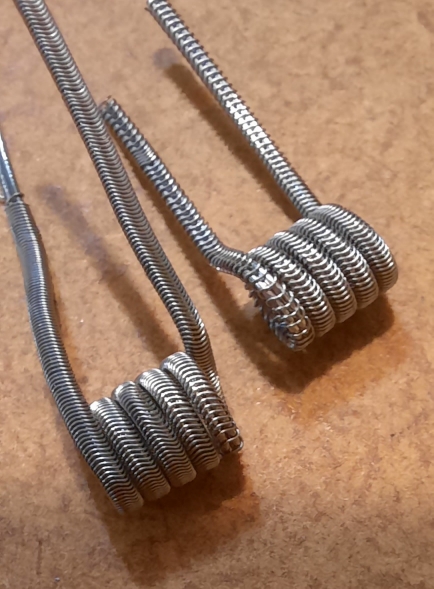
I find 3 core aliens to be easier for some reason. That's how I learned to do them.When it rains, it pours. Sent out 2 orders today, got 2 more. Made a 15" 3×28/36+36 SFC(v) for one of the orders. I got 4 good coils from it. And tried a 2-core alien, my first squiggly wrap.
I only want it to taste amazing. Is that too much to ask?

Looks great! Would that happen to be 3D printed? I have been looking for a STL file for the SQ217. No luck yetGot my door almost complete for my PZLD Star Wars mod. Just need to pick up some micro mesh to finish it off. I was hoping to have it done before the 4th of this month, but too much stuff got in the way. Still designing a new fire button for it, thinking of putting the Emperial emblem on it.
View attachment 181566
It is printed. I had to make the file for myself on this one. I did make a button for the SQ, but no doors yet. If I get some doors made up, I will try to remember to send you a PM with the files.Looks great! Would that happen to be 3D printed? I have been looking for a STL file for the SQ217. No luck yet
That would be wonderful, thank you so much!It is printed. I had to make the file for myself on this one. I did make a button for the SQ, but no doors yet. If I get some doors made up, I will try to remember to send you a PM with the files.
That is awesome!!Got my door almost complete for my PZLD Star Wars mod. Just need to pick up some micro mesh to finish it off. I was hoping to have it done before the 4th of this month, but too much stuff got in the way. Still designing a new fire button for it, thinking of putting the Emperial emblem on it.
View attachment 181566
I'm with you on that one!I put new builds in two Elder Dragons. I got sick and tired of the Philips grub screws though. I don't know why but I never switched them out to hex head ones. I just found some of the right size and put them in there. I think they were the M2.5 size x 4mm that I got at FT. Much better now. I even dislike flat head screws but not as much as Philips.
I put new builds in two Elder Dragons. I got sick and tired of the Philips grub screws though. I don't know why but I never switched them out to hex head ones. I just found some of the right size and put them in there. I think they were the M2.5 size x 4mm that I got at FT. Much better now. I even dislike flat head screws but not as much as Philips.
I've been using one of the little orange t-wrenches things that came with one of my Griffin tanks years ago. There's mostly only two sizes. IIRC they're M2.5 and M3 but I could be wrong about that. Those little wrenches had one of those two sizes on each end.So how do you folks keep your hex wrenches organized? I just cringe when I see hex screws in an RDA, because then it's trial and error to find the right size (I've grabbed wrenches of various sizes and I keep them in a plastic pouch, inside a box, that's on the opposite side of my end table and a PITA to get to).
If the screws are flat head or phillips, it's easy peasy because I have those screwdrivers in my toolkit and I always know where they are.
I keep mine on the organizer they come with. These are the two types I have laying on my workbench all the time.So how do you folks keep your hex wrenches organized? I just cringe when I see hex screws in an RDA, because then it's trial and error to find the right size (I've grabbed wrenches of various sizes and I keep them in a plastic pouch, inside a box, that's on the opposite side of my end table and a PITA to get to).
If the screws are flat head or phillips, it's easy peasy because I have those screwdrivers in my toolkit and I always know where they are.
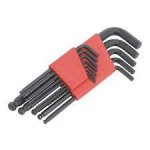

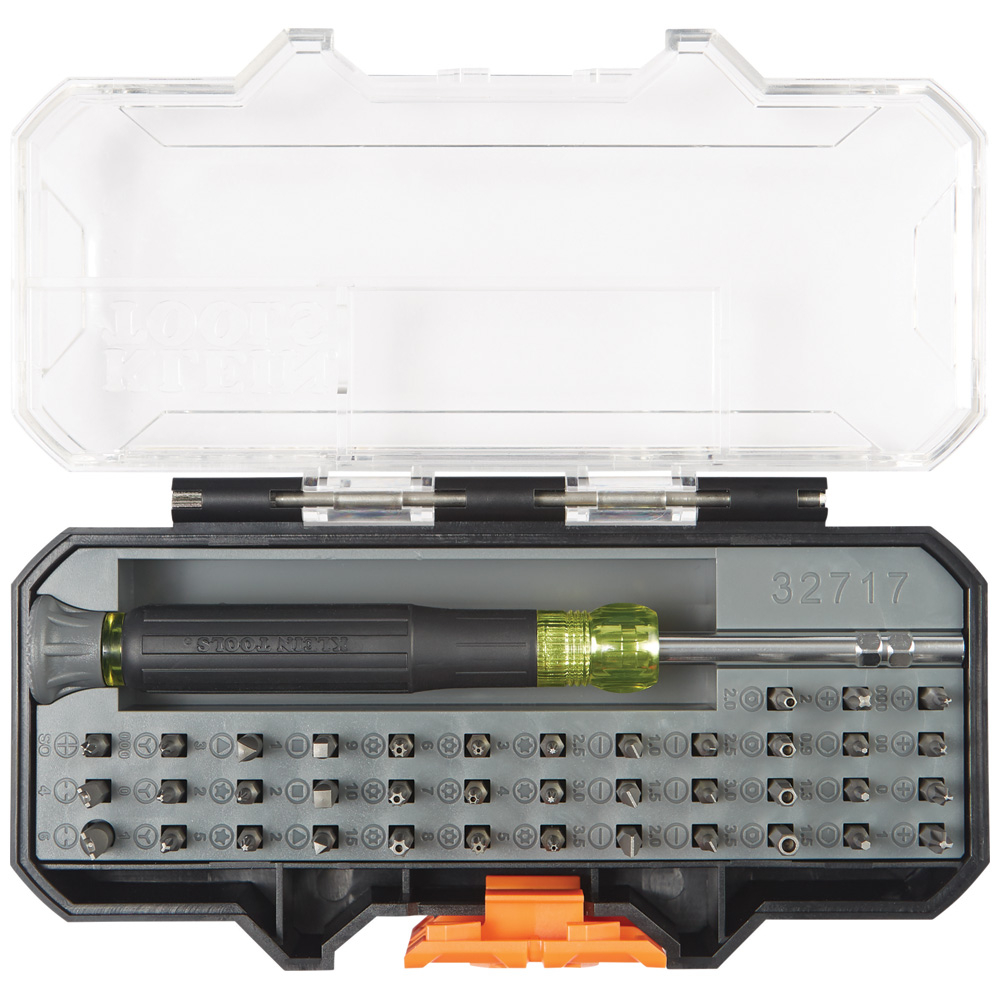
I keep mine on the organizer they come with. These are the two types I have laying on my workbench all the time.
View attachment 181621View attachment 181622
This is what my precision kit looks like:

It's way better quality than the Wal-Mart one. I've had those bits bend and deform. I got the Klien one from Home Depot for $20 I think..

I ended up getting some more N90 wires to try out. I've been using an N90 alien on my Squeezer mech squonk. Its 3x28/38, 5 wraps, 3mm ID. A coil with those specs made out of N80 wire would read approximately at .3Ω. With N90, it's at .19Ω. It fires fast and hits great. The flavor is really good as well.
I keep telling people there's so many ways to get to a certain resistance reading. People always post vague resistance readings and what wattage is expected.
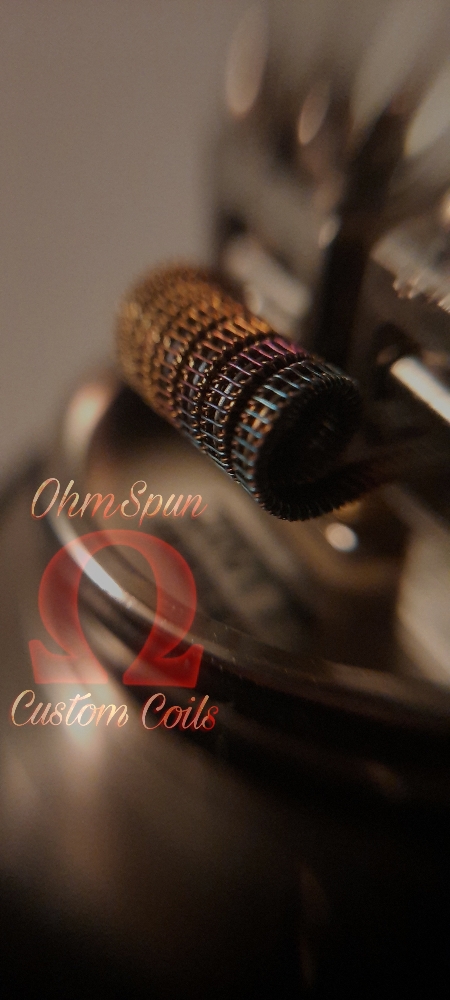
My aliens turned blue a bit when I dry fired them. Love your photo! I haven't tried mixed types of wire for photos yet. Some of the stuff on Instagram makes me think some people are nuts.Funny you mention N90. I replaced one of the cores in my tricore SFCs with N90 and the resistance went down a few ohms. I did it to experiment with resistance values and for artistic value. Also did the final fuse in SS. It turned out great. You also basically vape the same specs I do (3×28). Love your build photos.
I only want it to taste amazing. Is that too much to ask?
It does seem slower than normal. I have been lurking a lot more than I normally do, but I have been really busy lately. After the weather got nicer, I find myself busy with projects that have built up over the winter and have a lot less time to browse the forums. I wouldn't be surprised to hear a few others are experiencing something similar.My aliens turned blue a bit when I dry fired them. Love your photo! I haven't tried mixed types of wire for photos yet. Some of the stuff on Instagram makes me think some people are nuts.
Does this forum seem really dead to anyone? I know I haven't been posting as much as in the past. I have a feeling that there's lots of lurkers these days not saying anything lol.


Aye, that and actually being back to work away from home has got me a bit away from the forum. Well 1 AM here, thinking it's rack time for this Bozo. Y'all run 'er slow.After the weather got nicer, I find myself busy with projects that have built up over the winter and have a lot less time to browse the forums. I wouldn't be surprised to hear a few others are experiencing something similar.
down a few ohms

They sound like great all around systems, for gaming or video editing given the high core count cpu's he's got in there. Or any task that can make use of lots of processing cores. Performance gpu (graphics cards) are great for gaming but can help in other situations as well. Streaming, boosting video editing, offloading some rendering jobs. Probably has more $$ in that 3090 than I have in my entire system lol.I take it those are gaming systems? I thought I knew a little something about PCs, but those are different animals indeed.
Water cooled? Graphics systems must generate a helluva lot of heat.
I'll admit to being a dinosaur - one of my first encounters with computers was an IBM 360 mainframe that had water pipes underneath the floor to cool it down. That computer plus the disk storage and printers wouldn't fit in my living room! The first laser printer I ever saw was the size of about six filing cabinets. It had its own programming language, so sometimes there were some interesting things coming out of it as people learned how to use it!
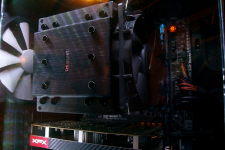
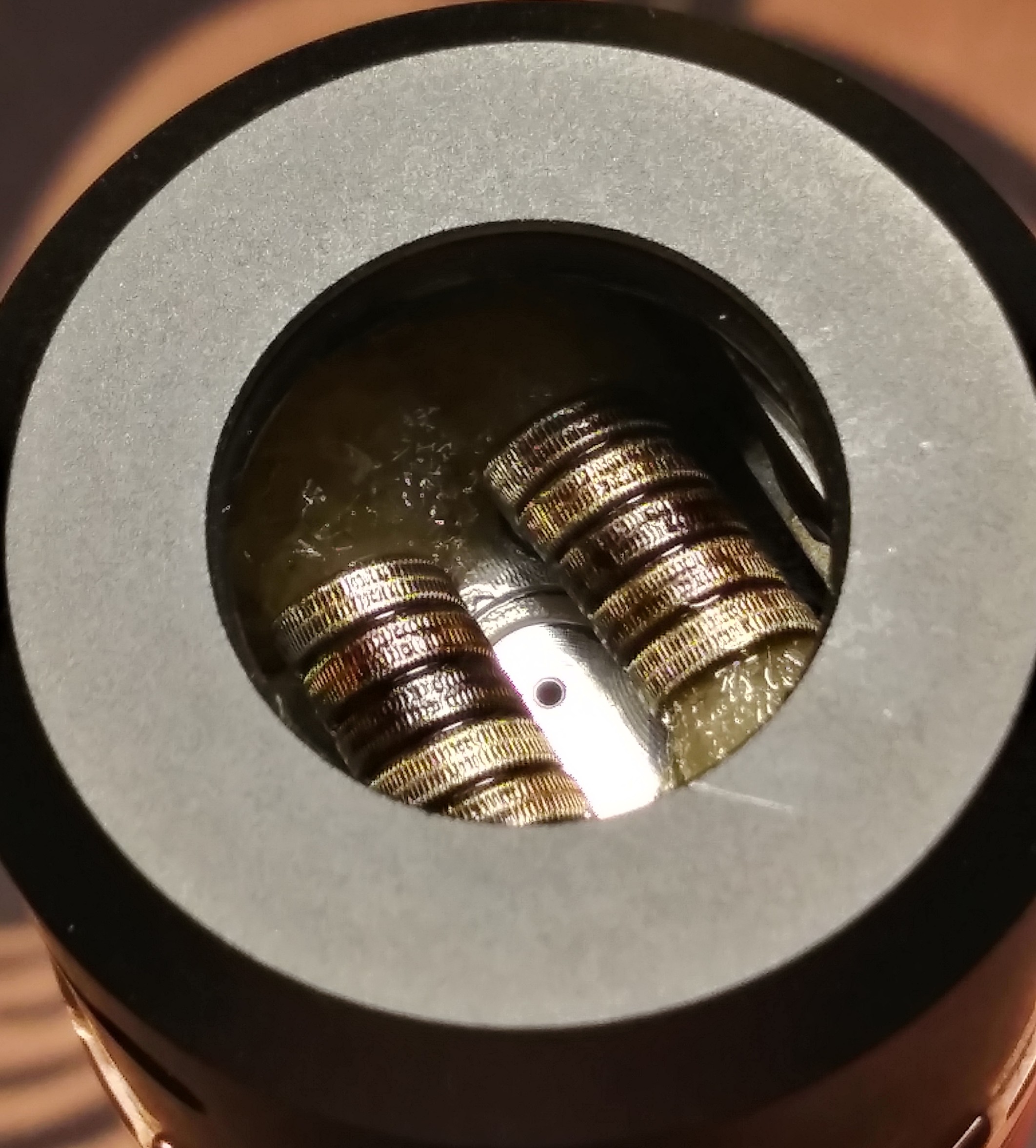
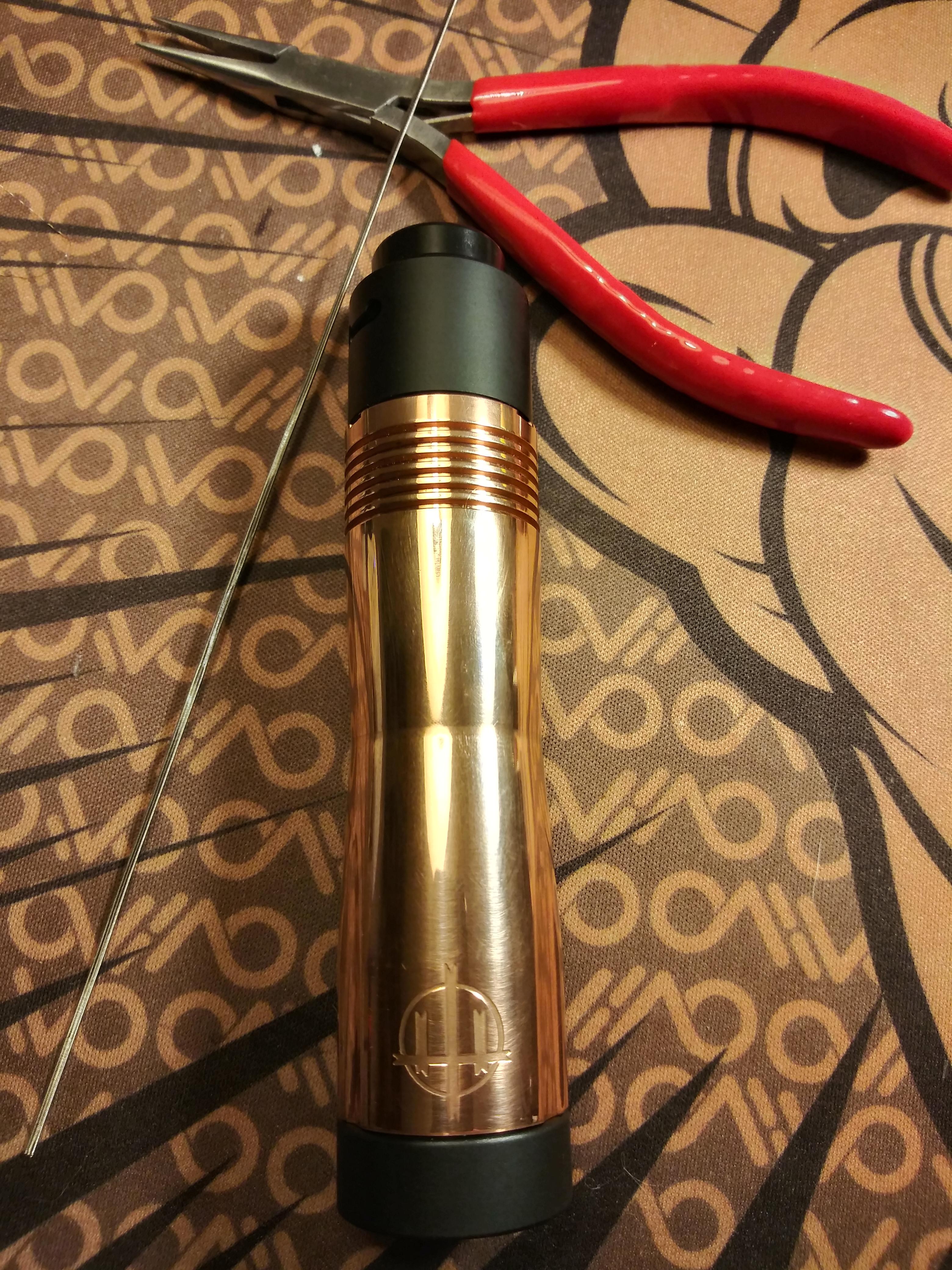
Impressive. The thinnest wire I've used so far is 40 and that's just for flat claptons. I've staggered 38g,but not 40. Beautiful workRound 2 with the Coilturds RDA is a smashing success. I made some SFC coils for it with 42ga N80 on 27GA cores. That 42ga wire is friggen tiny. I used magnification and couldn't tell if I was making spaced clapton wire at all. I just went with it and used some Jedi skills. I needed to use the power of the force.
The regular cap was too warm on a copper tube. I got a set of cloud caps that work perfect for this. They're not super pretty anymore but this is delicious:


Super awesome build mat was courtesy of PastorFuzz.
Made up some basic claptons for the manta rta. I don't know why I even try round wire builds in dual coil wider airflow atomizers. They just seem to struggle, burn my wick when I turn up the wattage and the flavor is piddly. Laziness I guess. Still not large coils, 2.5mm id 26/38 claptons 7 wraps. Amazing what the clapton wrap does for it, essentially the same I had in there. Like 9 or 10 wrap 26ga, but the flavor nearly doubled. I was wondering why the juice I just mixed up seemed so weak on flavor. If I had any sense (which I rarely do) I'd make up some extra coils or wire shots to have on hand instead of just throwing small roundwire coils into stuff.
Even parallels don't really seem to do much for me for direct lung. Not for flavor. Maybe because the thickest gauge stainless wire I've got is 26ga? I thought I had some 24ga someplace but can't recall seeing it the last few times. Could be I misplaced it. I did try some parallel round in my expromizer mtl rta but I toyed with a staged coil, 26 and 28ga alternating. To see if it boosted flavor and I don't think that's working for me either. Not for mtl, results in either wispy vapor turned down lower or a hotter vape than I enjoy for mtl. Need to stick to thinner round wire gauge for that one.Why not try throwing some small round wire parallel coils into stuff? That seems to work quite well for me.....
